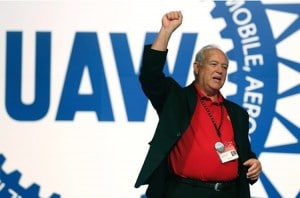
As negotiations between the United Auto Workers and the Detroit Three automakers near, the union focusing on some big ticket items, including helping the automakers find away to reduce health-care costs.
UAW President Dennis Williams today made it plain during a session with reporters at Solidarity House that he is philosophically opposed to the notion that employees should pay a larger share of their health-care costs through increased copays and deductibles.

As it automakers pay only about 6% of the health care costs while retirees from General Motors, Ford and Chrysler pay 11% through the VEBA trusts created in recent years to shift the financial burden from the company books.
However, the UAW is open to exploring other options, such as using the auto industry’s purchasing power to drive down costs though some kind of pool arrangement, according to Williams, who noted that the UAW has developed a substantial amount of expertise in the health care.
The industry also should support changes in patent legislation that would reduce the power of drug companies to block the production of generic drugs.
Williams, however, also indicated he was also looking to increase the pay of both new hires and so-called legacy workers right across the board.
(Top labor negotiators leave GM, FCA before talks. For more, Click Here.)
“We’ve been able to achieve some great things in the past few years. As you look around the industry, we see a lot of new products and new processes that have made these companies a lot of money,” Williams noted. “The UAW helped the entire industry get back on its feet.”
Williams added the union is looking at different models for “bridging the gap” in pay between legacy workers making $30 per hour and new hires who make roughly $16.50 under the current contract. He did not explicitly rule out some kind of “grow-in” period for new hires, but said it would have to be significantly shorter than the 10-year period that now prevails in Canada.
(Click Here for details GM’s investments in its facilities.)
With automakers seeking to hold the line on labor costs, the differences between the two sides appear as stark as ever and the UAW will have the right to strike all three companies. Last time around, strikes were prohibited at GM and Chrysler because of language included in the bailout packages underwritten by the federal government.
Williams, however, played down the strike threat and the chance of walkout. The last strikes were at GM and Chrysler in 2007, but both lasted only hours.
(To see how the growing economy means new car buyers are spending more, Click Here.)
“I never go into negotiations without being prepared,” Williams said. “But we believe we can get through collective bargaining without a confrontation. It’s not really on my mind. We’ve raised dues to build up the fund, but the last thing we want is for our members for their families or their communities is to go through that.”








UAW retirees got gang raped by the auto companies and the car companies should be punished for this travesty of justice.